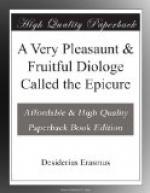eternall life. SPV. Your saiynges are muche
like too bee true. HED. Nowe the pleasures of
feastes dooeth not consist in the delicates of the
mouth, nor in the good sauces of cookes, but in health
of body and appetite of stomacke. You may not
thynke that any delicious person suppeth more pleasauntly
hauyng before hym partriches, turtelles, leuerettes,
bekers, sturgeon, and lamprayes: then a vertuous
man hauyng nothig too eat, but onely bread potage,
or wortes: and nothyng || too drynke, but water,
single bere, or wyne well alayde, be cause he taketh
these thinges as prepared of God vnto all lyuyng creatures,
and that they bee now yeoue vnto him of his gentyll
and mercifull father, praier maketh euery thyng too
sauour well. The petition in ye begynnyng of dyner
sanctifieth all thynges and in a while after there
is recited some holy lesson of the woorde of God:
whiche more refresheth the minde, then meate the body,
and grace after all this. Finally he riseth from
the table, not ful: but recreated, not laden,
but refreshed: yea, refreshed both in spirit
and bodie, thynke you that any chief deuiser of these
muche vsed bakets, & || deintye delicaces fareth nowe
more deliciously? SPudeus. But in Venus
there is greate delectacions if we beleue Arestotell.
Hed. And in this behalfe the vertuous manne
far excelleth as well as in good fare, wiegh you now
the matter as it is, the better a manne loueth his
wife, the more he delecteth in the good felowship
and familiaritie that is betwene theim after the course
of nature. Furthermore, no menne loue their wiues
more vehemetly then thei that loue theim eue soo,
as Christ loued the churche. For thei that loue
the for the desire of bodely pleasure, loue the not.
More ouer, the seldomer any man dooeth accompany with
his wife, the greater pleasure, it || is to hym afterwarde,
and that thyng the wato poete knew full well whiche
writeth, rare and seldome vse stereth vp pleasures.
Albeit, the lest parte of pleasure is in the familiare
company betwene theim. There is forsothe far
greater in the continuall leadyng of their liues too
gether, whiche emongest none can be so plesaunt as
those that loue syncerely and faithfully together
in godly and christian loue, and loue a like one the
other. In the other sort, ofte whethe pleasure
of ye body decaieth & waxeth old loue waxeth coold
& is sone forgotto, but emogest right christe me, the
more ye the lust of ye flesh decreaseth & vanisheth
away, ye more the al godly loue encreseth || Are you
not yet perswaded that none lyue more pleasauntly
the they whiche liue continually in vertue and true
religio of god? SP. Would god all men were
as well perswaded in that thyng. He. And if
they bee Epicures that lyue pleasauntli: none
bee righter Epicures then they that liue vertuously,
and if we wyll that euery thyng haue it right name
none deserueth more ye cogname of an Epicure, then
that Prince of all godly wisedome too who most reueretly




